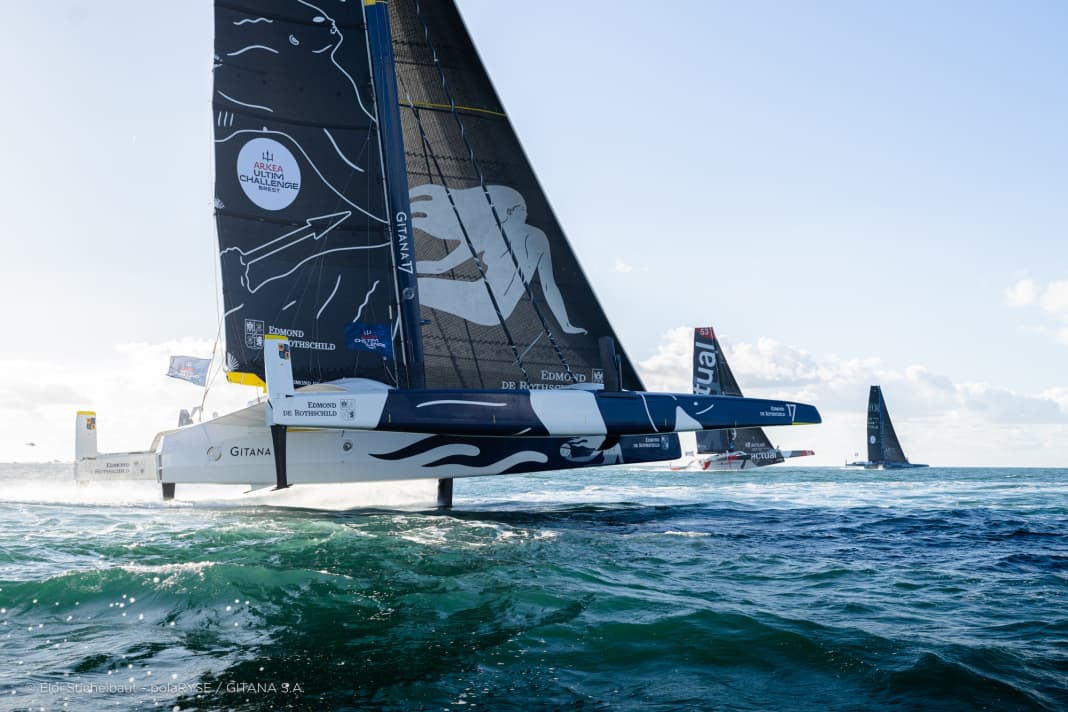





On the occasion of the current Arkea Ultim Challengewhich started with six 105-foot trimarans chasing single-handed around the world, some of which collided with unknown objects during the race, racing yachts have come under heavy fire from environmental organisations. This is not the first time that offshore sailors have been accused of being responsible for the majority of such collisions with whales. These would be severely injured or even killed. Some are therefore even calling for foils to be banned.
This is because research conducted by the German Whale and Dolphin Conservation Organisation Meer e. V. had already shown in 2010 that the probability of collision with sailing boats increases dramatically at higher speeds. Foils, which allow racing boats to reach significantly higher speeds, were not yet widespread. However, another finding of the study at the time was that collisions occur even at slow speeds. Among other things, this was due to sleeping animals and the low noise level of a sailing boat compared to other noise levels in the oceans.
Research on UFOs: Whales are victims of 99 per cent of collisions
The French ecology medium "Reporterre" investigated 18 French offshore regattas between 2008 and 2022 and came up with 51 reported collisions. In the article, former offshore professional Adrien Hardy claims to have collided with marine animals on around a quarter of his Atlantic crossings.
In general, however, after a collision with a UFO (Unknown Floating Object), it is rarely even publicised whether it was a crash with a whale. According to the marine conservation organisation "Sea Shepherd" and ocean researcher Philippe Borsa, this is the case in 99 percent of collisions. In most cases, however, it is not possible for the sailors to determine whether flotsam such as containers or marine animals were hit. In a statement, "Sea Shepherd" now accuses the sailing scene of concealing such incidents for reasons of popularity and marketing the sport.
More about sustainability:
This has now even been partially confirmed among professionals. The group of offshore sailors "La Vague" (The Wave), which is considered environmentally conscious and includes big names such as Paul Meilhat and Roland Jourdain, denounced the behaviour of its own scene and confirmed in a press release that some of the teams do register incidents involving whales but do not talk about them. They want to maintain a clean image and not associate such a reputation with their sponsors. The "La Vague" organisation is also calling for an end to the eternal hunt for records and the introduction of speed limits to protect animals.
Higher speeds increase the danger for marine life
This is because the higher speeds of racing yachts not only increase the risk of collision, but undoubtedly also the potential for injury to the whales. The appendages, which are thin but not sharp at the leading edge, especially the foils, are then enough to cut the sea creatures in half.
Another way to protect the sea creatures could therefore be to set up special exclusion zones on the course that race participants are not allowed to enter. This is because research has shown an obvious increase in whale collisions during regattas that pass through zones that are particularly frequented by whales. Such regulations already exist, including the current Arkea Ultim Challenge, where the area around the Kerguelen Islands is closed.
French mini-sailor Carolin Boule also has words of praise for them in an open letter published by "Voiles et Voiliers", in which she strongly criticises "the repeated and targeted attacks on the world of ocean sailing in recent times". These could have "serious consequences for the delicate balance of a system on which the professions of thousands of people depend", according to Boule.
Offshore sailor Carolin Boule: "It's a disgrace"
She is in favour of not stopping the development of technologies through heavy intervention. This applies both to warning systems, which can also be used on numerous cargo ships, and to foils. "It's a shame to suppress them without thinking about how much they can bring us. The efficiency of a foil can be up to ten times higher than that of a planing hull. For this reason, the foil is the technology that will significantly reduce the consumption of fast motorboats," says Boule, affirming: "Given the climate urgency, we must do everything we can to reduce the carbon footprint as much as possible."
The experienced offshore sailor would therefore like to see more collaboration instead of scathing criticism: "If you throw stones instead of proposing alternatives, the world won't move forward. There are hundreds of bright minds in offshore racing teams who, if they worked together, could come up with great solutions to make our world a better place. This is unlikely to happen if sponsors decide to withdraw their funding because they are afraid of being associated with the image these organisations paint of our world."

